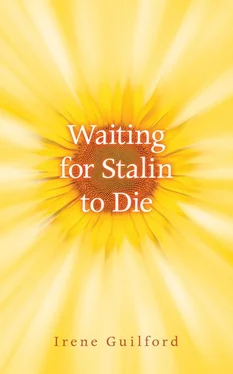“Oh, I was quite a catch in my prime,” she said, noticing Justine’s look. “Quite a prime it was too, if I say so myself. Wasn’t it Jimmy?” She raised a coquettish hand to the back of her hair, a French roll spiralling upwards like a tornado.
“It sure was, honey. It sure was. You were gorgeous.”
Doris harrumphed at this back-handed compliment then continued.
“We went dancing every Friday night, didn’t we, Jimmy? Sometimes on Sundays, too. Cut quite a rug, didn’t we Jimmy?”
“We sure did, honey bunch. We sure did.”
They smiled at one another, kind indulgent smiles filled with private pleasures and love.
Doris rose. She took Jimmy by the hand. She placed him into her embrace, stout woman leading, skinny man attached like an apron to her front. And moving in a serene and stately fashion to music that only they could hear, they danced in a kitchen become a ballroom.
“Whew that was fun,” Doris said, dropping back down into her chair, her French roll unravelling. “We should do that more often. We should go out together. All of us. We’re friends, ain’t we?” she added with a sweep of her arm.
Everyone nodded. Then Povilas announced that he would be moving out so that Steponas and Justine could have the room.
”Of course!” Doris cried. “There must be room for the baby.”
Nudging one another with knowing winks, rocking an imaginary baby, Doris and Jimmy sang.
Rock a bye baby
In the tree top
When the wind blows
The cradle will rock
When the bough breaks
The cradle will fall
And down will come baby
Cradle and all
Steponas grinned. Povilas slapped him on the back. Jimmy fell into a coughing fit. Doris smacked him on the back. Justine blushed and looked down.
“Pay them no mind, honey,” Doris said, words slurring. “They’re jes’ men. Silly ol’ men. But we love ‘em, don’t we?” And swivelling her face ‘round, chin sunk into her palm, she gave Jimmy a happy look.
For a moment Justine caught a glimpse of a world where kindliness and good nature prevailed, where men’s wrongdoings were nothing more than minor character flaws laughed off by tolerant women. Forests did not contain the raucous laughter of soldiers and the clink of belt buckles. Misunderstandings did not lead to war. Evil did not flourish. She wished it were true but history, bitterness and a sense of grievance pushed the vision away.
The party drew to a close. Rising unsteadily to her feet, Doris planted a sloppy kiss on Justine’s forehead. She gave her a mischievous little shove towards the bedroom.
“Off you go now,” she said with a giggle. “You have work to do.”
Six months later, Justine was pregnant.
Steponas wanted to name their daughter Veronika, after his mother. Holding her daughter in her arms, waiting for the flood of happiness to fill her, she nodded her absent agreement. What if I can’t love her? she thought, looking down at the sucking mouth, the clenched flailing fists. And feeling nothing but rising panic, she thrust the little creature back at the glowing nurse.
Steponas brought a gift to the hospital, presenting it to his wife as she lay in bed. Letting him place the pretty silver watch on her wrist, she struggled not to pull away. What is wrong with me? she thought, wanting to be grateful. And seeing Steponas’ pride, awe and joy at the little creature lying in the crib next to her bed, she craved to feel the same.
“Everything will be alright now,” he said.
Justine nodded, holding back tears and hoping that it might be so.
Doris took to little Veronika instantly. She cooed and giggled. She gave her finger to the little girl’s fierce grip. She glowed at the child in a way that Justine could not. And jealousy tore Justine’s heart.
“It’s my child,” she said, snatching Veronika back . An ugly thought flashed through her mind. She will love only me.
“Of course, she is,” Doris said. “It’s none of my business dear but the more people who love her, the better. Everyone needs love and protection. The small. The weak. People damaged through no fault of their own.”
“So now you know everything about children?”
“You are her mother, dear,” Doris said, stepping back with a sigh. “Of course you know best.”
But I don’t, Justine thought with dismay. I don’t know best. And I don’t want to be her mother.
She stared out at the bare winter garden. The weak sunshine held a false warmth unable to melt ice or bring forth green shoots from the dark earth. It was a mistake to have this child, she thought. A terrible mistake. And cradling the child’s head, she put her lips to the thin wispy hair.
Justine started teaching piano, giving lessons on the second floor of Lithuania House. Sitting in the hollow dusty room with creaking floors, bending her head to the children of exiles, she would listen to banging which could do no further damage to the old piano. Listen, she would say, holding a finger aloft. And pacing round, beating time with the ruler, sometimes she would rap their knuckles.
She played the organ at mass on Sundays and for weddings and funerals. Agreeing without protest, she sat in the choir loft, the soloist beside her. The music grew dull. Pleasure left her. Playing only out of duty, delight disappeared.
She tried teaching her daughter, seating the child on her lap at the keyboard. Pressing first one key then another, she would watch for a reaction. The child twisted and squirmed, wanting to be set down. You’re no Mozart, she thought. You certainly haven’t inherited anything from me. And standing the child back on the floor, she gritted her teeth against the wailing.
Then one day the student arrived. He was a bright-faced boy with blue eyes, light brown hair and a sky-blue plaid shirt. He was eight. His name was Eddie. And he wanted music.
“So. You like the piano.”
“Yes,” he said, boldly stepping forward to show what he could do.
Her heart stirred. He had talent. She bent over him. She cupped her hand over his, curling his fingers.
“Like this,” she said. “Do you see?”
A smile appeared at the corner of his mouth as the sound grew richer, a private smile meant only for himself. He had forgotten the dusty room, the creaking wood floors, the din of traffic outside. He had forgotten even her, sitting beside him. Captivated, entranced, he was aware of nothing but the music.
“What music do you like?” she asked.
“Mozart,” he announced. “I listen to the opera with my father.”
Mozart. The god of beauty and perfection, clarity and light. Too easy for children, too difficult for adults. As she knew very well herself.
“You will have to work hard. Very hard. Are you willing to do that?”
“Of course,” the boy said turning upon her a look of total surprise.
She hid a smile. “Do you have a piano?”
“Father just bought me one. One hundred dollars. And mother doesn’t like it.” He clapped his hand over his mouth with a wide-eyed irrepressible giggle.
Justine had seen the father, a construction worker whose capable hands treated the boy with tenderness. She had seen the mother, a sour woman with a rough touch. She could see the arguments over pennies put aside, saved in the glass jar of the child’s future.
“You must practise every day. After school. Will you do that?”
“What about baseball practise?”
“What about music?”
The boy placed a finger to his chin, appearing to give it serious consideration.
Читать дальше












